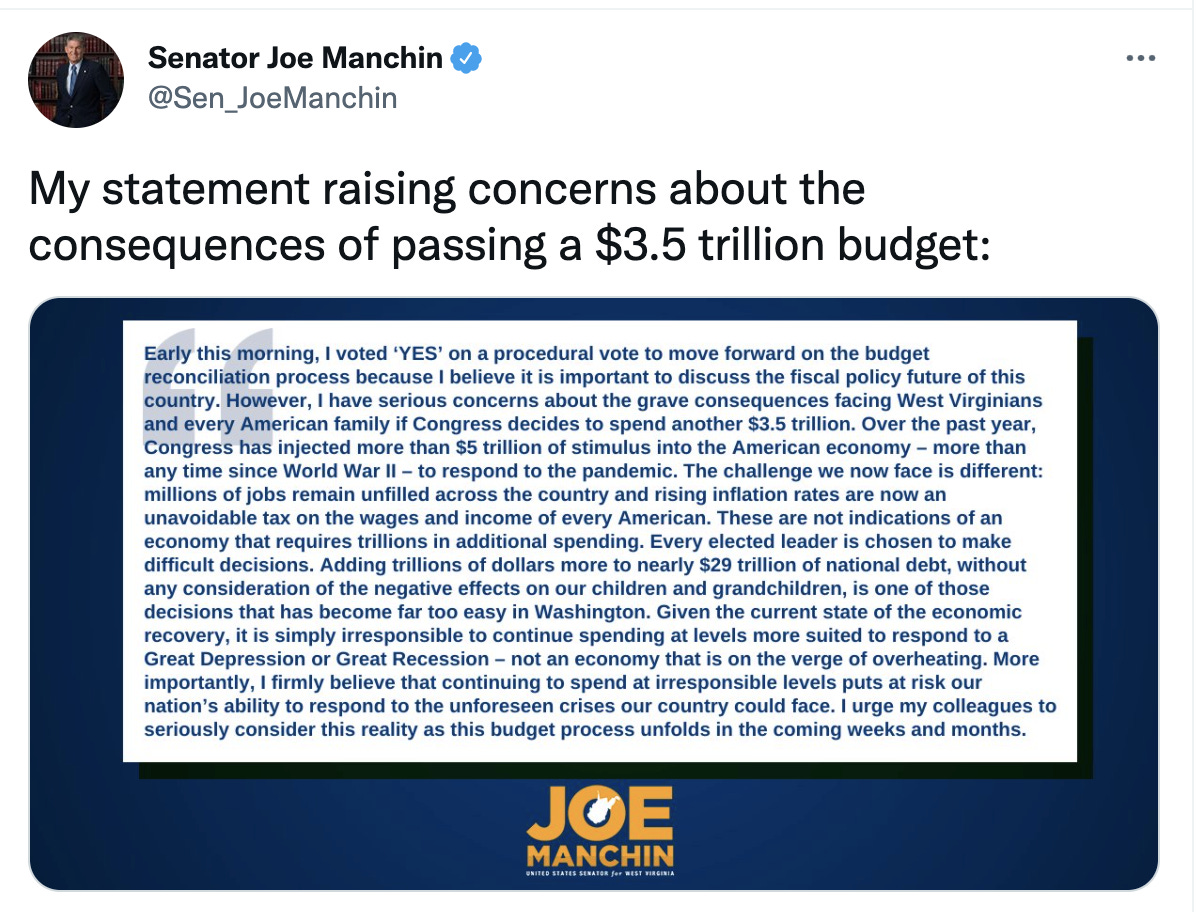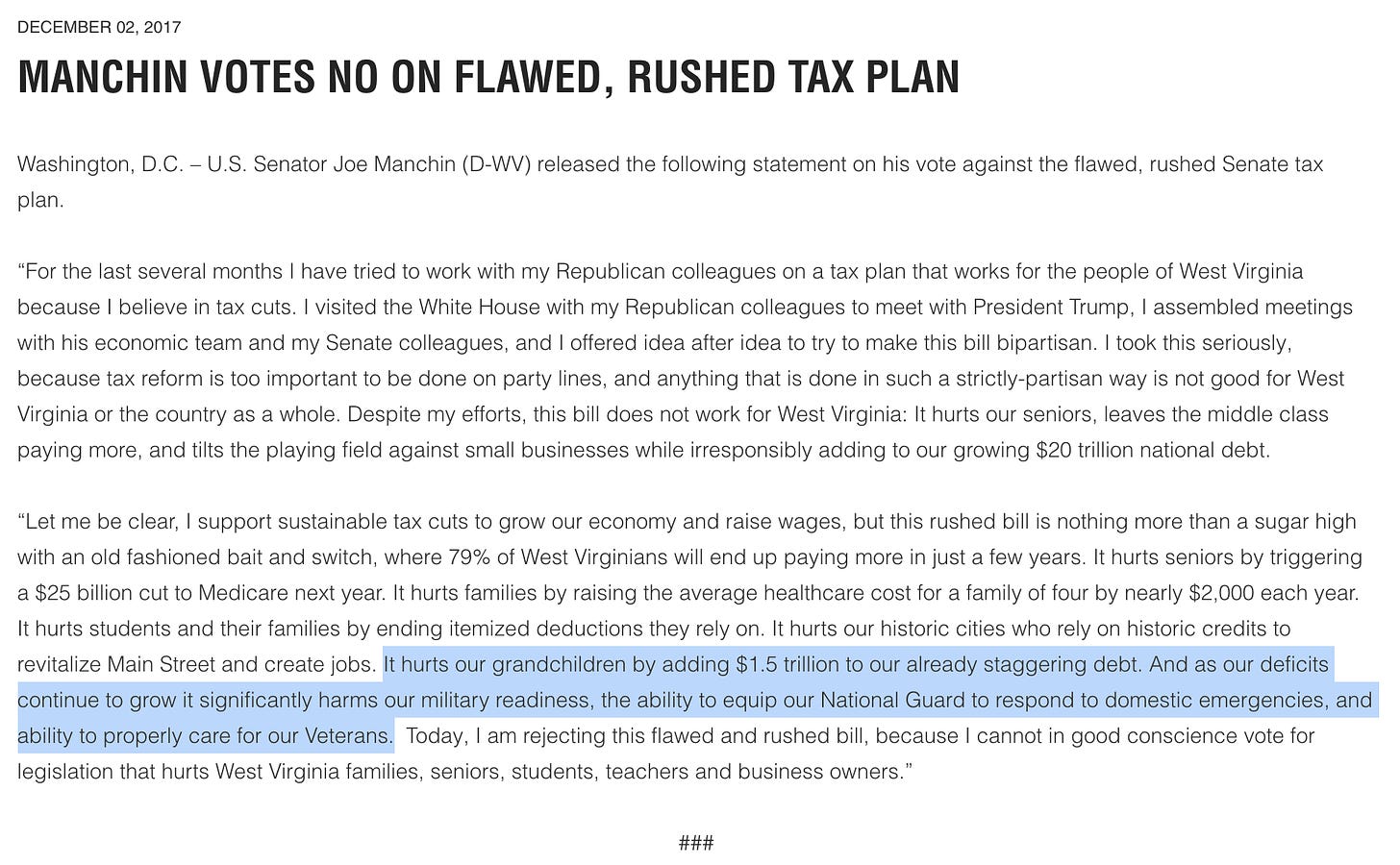Just hours after voting (with all Democrats) to set in motion a $3.5 trillion budget reconciliation bill, Sen. Joe Manchin (D-WV) issued the following statement.
Out of curiosity, I checked to see what kind of statement (if any) Senator Manchin put out in response to the Tax Cuts and Jobs Act (TCJA), which passed via budget reconciliation on a straight party-line vote at 1:36 a.m. on December 2, 2017. I found exactly what I was looking for. And, frankly, exactly what I expected to find.
Here’s the statement he released on December 2, 2017.
It reminded me of these lyrics from Neil Diamond’s classic I Am…I Said.
Well except for the names
And a few other changes
If you talk about me
The story is the same one
Manchin’s statement is mostly boilerplate (Peterson Foundation) messaging that can be repurposed over and over simply by changing a few names and numbers. I’m sure it sounds compelling and even “fiscally responsible” in certain circles, but it really should ring hollow by now, for reasons I pointed out last week when a number of House Democrats raised similar concerns.
Here’s part of what I wrote:
The TCJA passed, adding an estimated $1.9 trillion to fiscal deficits over the next decade. Two years later, when COVID hit, Congress had no difficulty passing a slew of multi-trillion dollar spending bills. Not only did they have plenty of firepower to respond, they did it without raising taxes to “pay for” it. Oh, and last month, lawmakers voted to add $25 billion to the defense budget, boosting the annual appropriation to $778 billion.
How?
Easy. Congress has the Power of the Purse. It can’t run out of financial resources. If the votes are there, the money will go out. A central tenet of MMT is that a currency-issuing government can afford to buy whatever is available and for sale in its own currency. Fortunately, the deficits of the past don’t tie the hands of future lawmakers. If they did, we’d still be in the midst of a recession instead of a recovery.
Does Senator Manchin really believe that the Trump deficits in any way hampered our ability to respond to a domestic emergency? (Um, cough, cough…COVID…$5 trillion in fiscal support!) C’mon, Senator. It’s time to update your boilerplate.
P.S. None of us should be thinking of the reconciliation package as “stimulus.” That’s not what those investments are about. The Build Back Better agenda is about taking aim at some of the real deficits—education, climate, health care, housing, etc.— that are bearing down on us.
P.P.S. In researching this piece, I discovered that students at West Virginia University have their own “special” rendition of another classic Neil Diamond song.
P.P.P.S. I have seen Neil Diamond in concert seven times. Don’t tell anyone. 😉






Loved your book (it was my first foray into economics and you were super helpful in that regard), and I'm thrilled you've started this newsletter and seem to be workings towards addressing the everyday relevance of MMT (and calling BS to the deficit myth, as usual). It's greatly appreciated, and an idea that I can't wait to bring up this Thanksgiving, watching eyes go wide when I mention the power of the purse and the deficits that matter :)
Question: Is it just the default, gold-standard-era knee-jerk reaction that defines these head-in-the-sand responses to spending, or do you think people like Manchin know better, but they believe it's more politically popular to be "fiscally responsible" than to actually do big things?
the deficit bs has worked so they keep using it. Stephanie blew it out of the water but they just keep lying.